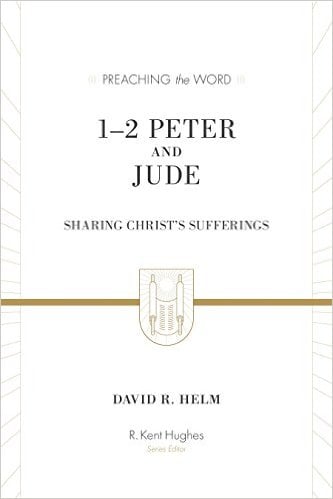⏱️ Estimated Reading Time: 4 min read
There are several books that reside near the back of the New Testament that I submit get overlooked in our zeal to push through to the book of Revelation and the renewal of all things we find at the end of that particular book. Before we get to the ultimate promise of redemption, there is the matter of our current state of existence and how we are to approach this thing called the Christian life and walk. Contained in 1-2 Peter and Jude, part of the aforementioned fly over books of the New Testament, are valuable truths on matters such as persecution, suffering, dealing with false teachers and those who desire to twist and distort the truth of Scripture.
In his excellent commentary on 1-2 Peter and Jude, David Helm digs deep into those important issues, providing the reader and user of this commentary with sound biblical insight from a pastoral point of view. Having recently written an article on a portion of 1 Peter 4, I can humbly attest to the fact this commentary from Helm was pivotal in helping me properly exegete and to additionally provide helpful application to the text for which I was studying and writing on.
I was most intrigued with Helm’s commentary on Jude. This small one chapter book can seem a bit strange to some and quite honestly, ask yourself when the last time you heard a sermon from Jude or when you even heard it mentioned in a biblically related conversation. After all, Jude talks about angels who did not keep their proper place and who chose to leave their domain. That action resulted in God placing them in everlasting chains. What is that all about? Jude also quotes from the book of Enoch, an extra-biblical text that is embraced by some and kept at arm’s length by others.
It was refreshing to read David Helm’s commentary on Jude, in particular, his treatment of the issues related to Genesis 6 which Jude addresses. He correctly notes the bene ha-elohim mentioned in Genesis 6 were angels who disobeyed God’s command and interacted in a sinfully sexual manner with humanity. Weird sounding? Very much so; however, this is the appropriate exegesis of Genesis 6 as well as the context of what Jude is addressing. As Helm saliently notes, the lesson is “Whenever we find ourselves succumbing to the temptations to live autonomously, to do as we please, to reject authority, to remove any notion of proper place or position, we are waging war against Heaven and are in danger of becoming subjects of judgment.”
I focused my comments a bit on Jude but this is not to say that Helm’s commentary on 1 and 2 Peter is no less stellar. As I noted earlier in this review, Helm’s exegesis of 1 Peter was quite helpful for a recent writing project I was involved with and it was his application of the text I found most useful. It is that application element that makes this particular commentary and for that matter the entire Preaching the Word series of which this effort is a part so good and worth investigating. Looking at a text from a scholarly angle is very useful. I take that approach quite frequently, especially when attempting to get at the meaning of words, issues of historical context, or things of that nature. Ultimately, though, we are called to apply Scripture to our life and thus, a commentary series that focuses on the application is a series I will tend to pay more attention to over more academic minded styles.
I highly recommend David Helm’s commentary on 1-2 Peter and Jude. It is excellent, chalk full of valuable insights, and most importantly, it will serve as a valuable tool as you examine these often overlooked books of the Bible. Spend some time in these books and have Helm’s commentary nearby when you walk through them.




